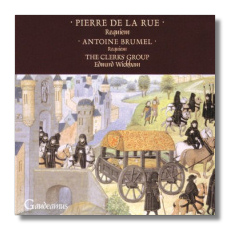
The Internet's Premier Classical Music Source
Related Links
- Latest Reviews
- More Reviews
-
By Composer
-
Collections
DVD & Blu-ray
Books
Concert Reviews
Articles/Interviews
Software
Audio
Search Amazon
Recommended Links
Site News
 CD Review
CD Review
Pierre De La Rue / Antoine Brumel

Requiems
The Clerk's Group/Edward Wickham
Academy Sound & Vision Gaudeamus CDGAU352 56m DDD
Pierre De La Rue and Antoine Brumel are almost exact contemporaries. Both were born in 'circa' 1460 and their death is separated by only two years; De La Rue's in 1518, Brumel's in 1520. During the second half of the 15th century, the Mass Ordinary cycle assumed a position of paramount importance, but for some obscure reason, the polyphonic Requiem was not able to command the same interest. The latter was only utilised for special occasions and the scant historical information does not leave us in a position to ascertain the reason behind the composition of the two Requiems we have on disc.
Although both seem to be similar, there are some important differences worth pointing out. De La Rue's work is a patchwork of ensemble pieces linked by a common thread of chant. His Requiem also employs the use of low ranges, and a manipulation of scoring to increase the dramatic contrast. The model for all these traits is to be found in Ockeghem, for whom De La Rue seemed to have a great admiration.
Brumel's piece betrays a certain affinity with Josquin and the Italian tradition. His more functional style aspires to not much more than the simple harmonisation of the chant tunes and through the languid and relaxed charm of this music, he is able to create some wonderful reflective melodies out of the simplest of ideas.
These two 'Offices of the Dead' (Officium Defunctorum) as they were initially known, are truly fine examples of Renaissance polyphonic art when it was starting to flourish, and which was to culminate in the absolute masterpieces of the Baroque era. Edward Wickham draws a committed and dramatic response from The Clerk's Group, whose singing is both reverent and dignified. This is an enjoyable CD despite its lean playing time.
Copyright © 2006, Robert Cummings




















